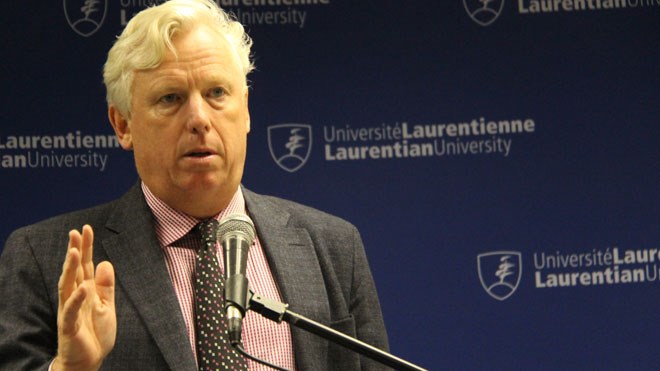Cities can lead the way in the fight against climate change, and Sudbury has already shown grassroots movements can make big improvements to the local environment, said former Toronto Mayor David Miller, during a public lecture at Laurentian University Monday evening.
Miller, who is now president and CEO of the World Wildlife Fund Canada, said cities are often more progressive than national governments when it comes to fighting climate change. He said municipal governments are built around solving real problems, while Parliament often deals with theoretical changes, and only creates legislation, but does not implement it.
“Sudbury should be proud of its environmental leadership, particularly around the lakes, dealing with acid rain and dealing with remediation of the landscape,” Miller said.
He added Laurentian University represents a leading model for collaboration between a post-secondary institution and local government.
“As a private citizen now, and as mayor, I always thought there should be a much stronger bond between educational institutions and people, and the city government.”
Miller said Sudbury's successful environmental remediation was thanks in large part to a grassroots movement that involved many Laurentian faculty members and other local organizations, such as Science North.
He said cities can use the same approach to tackle climate change, and create more sustainable communities.
While the federal government has not made a lot of progress on climate change, Miller said, cities like Toronto have implemented their own policies to find solutions to the global problem.
After implementing its climate change action plan in 2007, Toronto was able to reduce its greenhouse gas emissions by 15 per cent, Miller said.
The city has used water from Lake Ontario, for example, to cool many of the buildings near the lakefront.
Toronto also has a green building bylaw that has been in place since 2010, and requires new developments to meet certain environmental performance measures.
“Cities are showing leadership because they can and they must,” Miller said.
Because most of the world's population now lives in cities, and the world's cities are responsible for 80 per cent of all greenhouse gas emissions, it's more important than ever for cities to find progressive solutions to fight climate change, Miller said.
It may not be realistic for Sudbury to have a public transit system as efficient as Toronto's or Ottawa's, he said, but the city can make small changes to encourage more active transportation – such as walking and cycling.
Small changes to the transit system could also improve bus service, Miller said.
“Are there some places in the city where the buses can run in their own right of way?” he asked.
Join Sudbury.com+
- Messages
- Post a Listing
- Your Listings
- Your Profile
- Your Subscriptions
- Your Likes
- Your Business
- Support Local News
- Payment History
Sudbury.com+ members
Already a +member?
Not a +member?
Sign up for a Sudbury.com+ account for instant access to upcoming contests, local offers, auctions and so much more.
